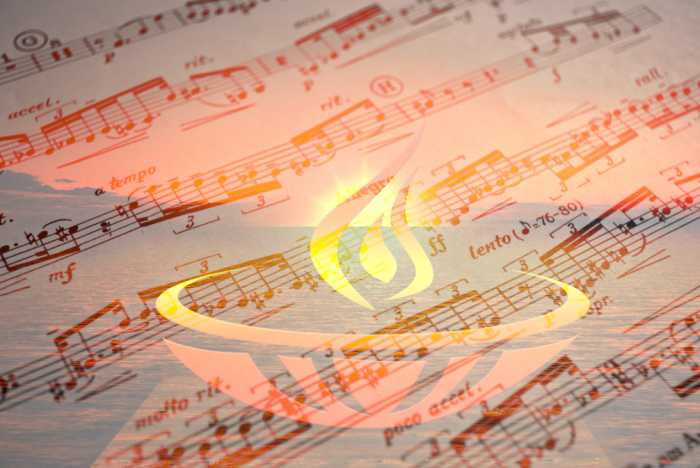Your personal music search space.
Augment your understanding of music.

______________________________________________________________________________

YMUSIC SEARCH ENGINE
Since antiquity, human beings have been conscious of themselves and wanted to fix knowledge to ensure that future generations can also benefit from it. For its part, musical knowledge was first kept on stones: precursors to sheet music include antique cuneiform tablets and medieval manuscripts. Music printing appeared during the 15th century. Today, sheet music can be read and even played on a computer screen. As the ways to keep music changed, the ways to retrieve it changed through time. Besides libraries, musical knowledge can now be acquired on the internet. What is musical knowledge? How can music listeners increase their musical knowledge? What can a music search engine bring to the modern music listener? Know more about these topics by reading the following essays.
MUSIC, KNOWLEDGE ACQUISITION AND SEARCH ENGINE TECHNOLOGY
To acquire new musical knowledge, try YMusic. YMusic is a prototype of a music search engine which relies on a new music theory; it is designed for all music listeners who are searching for music that is new for them and who are trying to develop their knowledge, be they casual listeners or not.

To acquire new musical knowledge, try YMusic. YMusic is a prototype of a music search engine which relies on a new music theory; it is designed for all music listeners who are searching for music that is new for them and who are trying to develop their knowledge, be they casual listeners or not.
SEARCH, RELEVANCE AND MUSIC
Searching on the internet is now perceived by individuals as a solved problem, yet not by companies. Why? Actually, even in the field of personal searches, there are easy information-seeking problems and hard ones. To locate a music shop is an easy problem, yet to find good music to go jogging to is already a little harder. Judging the quality of a result is related to relevance: is the result perceived as appropriate or closely connected, or not? Actually, when search engines’ users make queries, results are relevant when the information they contain is directly related to the query, at least partly. Yet the relationship between queries and results are not enough to determine relevance. In fact, relevance depends on what is already known by users. So users’ background is linked to relevance too.
Information-seeking is an iterative process: on the web, like everywhere else, to reach good information and to transform it into knowledge requires repetition of queries, sorting and analysis. Generally, from an initial question, the searcher who is using a search engine is conveyed to results that lead to another question, and so forth: that is the iterative process. Each new piece of information leads users to new ideas and invites them to follow new directions. The result is that they create in themselves a new conception of the query. Furthermore, information-seeking is very subjective and it may depend on the cultural context. Finally, searchers use different terms for the same thing or, on the other hand, one word can have different meanings.
Anyhow, search engines have to deal with such issues in order to provide users with the best matches. And software engineers work hard not to exceed the maximum number of clicks users accept to accept making in order to conduct a piece of research or to entertain themselves. In general search engines, people use keywords to find information. Specialized search engines do not function in the same way. For instance, the YMusic search engine, currently under prototyping and based on a new music theory, provides listeners with music only based on musical criteria. What does this mean? That listeners can test features which help them to explore the main aspects of music at the musical level. Listening after listening, listeners become more aware of these aspects, they discover what they like in them, why they like the music they like and consequently they get control over their searches and can get more music they potentially love. When they find music through YMusic, listeners can judge if they are relevant for them or not and, in either case, reformulate their queries through YMusic’s features. YMusic is a search engine and not educational software. Even if it helps listeners to acquire more musical knowledge, it is, ultimately, to bring them music they love, that is why the search engine is here for them. It is not about teaching them how to listen or what to listen to, it is about empowering listeners with tools that guide them to what they naturally love or, more generally, find relevant.

A MUSIC SEARCH ENGINE TO MATCH MUSIC LISTENERS' QUERIES
Search engines are trying to classify elements people are interested in. Classical classification theories prefer to put each item in one category only, however, for engineers organizing internet data and for user interfaces, it is very useful to put items into more than one set and to allow the same object to be classified in multiple categories simultaneously. In the field of music platforms, music streaming services, which are not musical search engines, classify music with the help of cultural metadata, for instance composers’ names or songs’ titles. They are useful, yet they do not provide listeners with music according to strictly musical criteria. In contrast, the YMusic search engine, launched as a prototype and based on a new music theory, includes features that listeners may use in order to discover the main aspects of music, one after another. Being more aware of the true nature of music, listeners can understand it better and know what they love in a piece of music and also why they like it. Listening after listening, they consequently acquire the necessary skills to direct the search engine in order to receive more music they potentially like, spending less time looking for new music at random.
Search engines’ success depends on their ability to create a good user experience, that being about how the user interacts with the system according to what they are trying to do and want to understand. For that reason, YMusic’s user interface is pleasing to use and listeners will not get lost: without any confusion, they will find general search criteria and more advanced ones. Like general search engines, YMusic tries to solve the music listeners’ problems and it is evident that, when they want to use a search engine, music listeners’ main issues are then linked to a need for musical information. YMusic is thus about providing the best information related to music, based on musical criteria. Of course, the more music listeners do searches, and thus explain their needs, the better job the search engine can do of matching their queries.
Internet searches have an impact on culture. For instance, in the field of music, the discovery of new music that is relevant may help a music teacher to construct a new course or a student to organize an evening of entertainment. What decides the quality of a search in a digital world where every piece of music can be heard and every image can be seen? It is all about sorting results in an effective way. Sorting results is not an easy task and in the field of music as in all areas of knowledge, traditional classifications may be restrictive. Music genres, for instance, offer, at first glance, a certain interest. They are useful to discover a piece of music that is totally new because it comes from another region of the world or, since it was written in ancient times, its form is unknown. Yet the concept of genres can be limiting too and that is the reason why YMusic offers musical features, in order to help listeners to discover their individual music tastes.

To acquire new musical knowledge, try YMusic. YMusic is a prototype of a music search engine which relies on a new music theory; it is designed for all music listeners who are searching for new music and who are trying to develop their knowledge, be they ordinary listeners or not.
INFORMATION AND ITS CATEGORIZATION IN GENERAL AND SPECIALIZED SEARCH ENGINES: THE CASE OF MUSIC
General search engines are the most powerful tools to find information people have ever known. They affect all Western societies and even developing countries. Unfortunately, it is still hard for search engines to understand the objectives of users asking questions and to represent meaning more directly. Search engines cannot easily make matches based on meaning. But what is meaning? Actually meaning, and thus relevance, is defined by users in numerous ways and it is why a general search engine may sometimes have difficulty in satisfying everyone. Couldn’t search engines progress in order to better read the human mind? It is not easy, as the various aspects of the human mind are studied through various approaches, each one corresponding to a specific field of knowledge. That is why relevance is generally thought of by users in function of users according to their own expertise and needs.
Users are searching for one result in a lot of documents. Engineers, for their part, have the opposite problem: they have to organize massive amounts of results in one unique meaningful way. They must create search engines that distinguish what is important in a query, what is related to it, etc. They have to design flexible functions so that their engines may explore and navigate information. Yet search engines today do not really navigate information. When they receive queries, they check large databases to see if they have documents that can match them. A standard way for engineers is to put everything in a big tree structure but it forces the choice of one dimension over another one. For instance, will documents related to history be sorted by date, location or topic? Using different facets, or more simply categories related to different aspects of a concept, is a solution. These facets can themselves be divided into smaller categories, and so on.
Besides general search engines, specialized search engines are very useful. And a key question software engineers must answer is: ‘How will we structure information both for search and browsing?’. In the field of music, the YMusic search engine, based on a new music theory and currently prototyping, presents musical information in a way that is meaningful for music listeners. Centered on music itself rather than cultural metadata like listeners’ gender or music composers’ names, it offers features that make elementary musical analysis accessible to the largest number of music listeners and not only to composers themselves or teachers. What do listeners want music websites to do for them? To provide them with music they like. But what is music? And what is like? Each music listener has a personal definition of music and likes specific styles of music. How can YMusic help? With its features, listeners can get a better understanding of the nature of music in its different aspects. Listening after listening, more aware of what they like and why they like it, it becomes easier for them to get more of what they really love.


Do you want to acquire new musical knowledge? Try YMusic. YMusic is a prototype of amusic search engine which relies on a new music theory; it is designed for all music listeners who are searching for music that is new for them and who are trying to develop their listening skills!
A MUSIC SEARCH ENGINE TO MATCH MUSIC AND MUSIC LISTENERS IN MORE EFFICIENT AND ENTERTAINING WAYS
One reason why the internet is revolutionary is its unseen integration of capabilities. In fact, it is both useful for information and knowledge dissemination and for global interaction between individuals as well as businesses or institutions. Coming from visions of a globally connected ensemble of computers that would let people run from one to another in order to access programs and data, the internet is the first global information infrastructure that is, to a large extent, accessible to as many people as possible. Expanding users’ horizons, the internet is a complex structure that presents several main aspects that include technology. In fact, to disseminate information online, it is necessary to acquire it. And also to analyze it, which is not so easy, because of the amount of data now available online, in all fields of knowledge. Computers being enjoyable, everyone on Earth having some passion wants to share it online.
The construction of the internet is still in progress and in that context, the case of online music services is interesting. In fact, the whole music industry is online, due to implementation efficiency. Music streaming services, for example, are complex platforms and they are the products of associations between the owners of the platforms themselves, but also music publishers and other rights management organizations. Thus these platforms are, in themselves, infrastructures. And the YMusic search engine, launched as a prototype, based on a new music theory, is a new long-term experiment: its development will evolve over the years to come. At the moment, streaming services provide millions of users with millions of songs, mainly relying on elements like listeners’ gender, age or location, or cultural metadata like songs titles, to respond to queries. YMusic helps these listeners to analyze music at the qualitative level, through different features, even when they do not know music. Yet it presents anit is also of interest to music researchers who want to work on a large corpus of music.
YMusic’s technicalities have their importance because they are necessary to create matches between music and music listeners, but its features are reinforced by the unifying vision behind them: the ideal scenario is that all individual music listeners can know more about the music they love and get more music they can potentially love. There are two poles in music: an objective one, linked to the nature of music (which is presented in the theory supporting YMusic), and a subjective one, related to music listeners’ experience in the field of music and, more generally, in their life. Tracks match when YMusic’s algorithm, analyzing musical content, meets listeners’ expectations. It is a delicate exercise, because computing is not a perfect science (yet?), however it is not magic: results correspond to rigorous musical rules applied through the search engine’s features. Yet the use of the search engine has nothing to do with traditional music education: nobody tells music listeners what they have to listen to or what they will like or not. Curiosity is not a bad thing: on the contrary, it is highly encouraged to get the most out of the music contained in the database.
To extend your musical knowledge, try YMusic. YMusic is a prototype of a music search engine which relies on a new music theory; it is designed for all music listeners who are searching for music that is new for them and who are trying to develop their knowledge, be they casual listeners or not.
HOW IS A MUSIC SEARCH ENGINE DIFFERENT FROM A MUSIC RECOMMENDER SYSTEM?
The mechanisms of human thought are not yet very well known. That is why writing a computer program like a search engine is a very difficult exercise. The difficulty lies in teaching the search engine to consider users’ reactions in order to meet their expectations. Yet those expectations are not always explicit. But the more the search engine is interactive, the better the results are. And it must be: users’ attention is more and more difficult to get, as they have more and more material to discover online. The internet is really a revolution. Gutenberg’s printing press, invented during the 1400s, was a first step towards freedom of knowledge, however at that time, only a few citizens could afford the cost of printed books, which remained a luxury for several more centuries. Now, everyone’s life is touched by the internet, digital natives and digital immigrants.
The internet has really changed the music listening experience: in terms of quantity and also in terms of intensity. Once music records were expensive and music listening was primarily an experience shared between family members and friends or during public events. These ways still exist but new ones have appeared: online music listening can be a collective and real-time experience. Is it always an advantage? No, not always, as music listeners may sometimes feel they have a privacy concern or, more generally, the will to listen to music alone. In one word, they need to reintroduce music listening in the private sphere. Let us notice that, besides privacy, the question of online identity is interesting: all users can now reinvent their social identity online without even leaving their homes, for instance they can create different social media profiles and insert an aspect of their identity in each of them.
As they can have several social identities online, music listeners can have different musical identities: depending on their moods, on the cultural environments in which they evolve, etc. Having several musical identities may be fun, however individual music listeners can also feel the need to be conscious of their deeper self, beyond the different surfaces they usually want to see. Then how can they merge their various musical identities? It is easy: music listeners can use the YMusic search engine, which is currently under prototyping, each time they want to listen to music, whatever their mood is. Music listeners can use YMusic as an experimental means to explore their musical identity as well as a tool to acquire new musical knowledge: these two aspects are neither contradictory nor incompatible, they are complementary and over time, music listeners will get information that will constitute their musical profile.
HOW IS A MUSIC SEARCH ENGINE DIFFERENT FROM A MUSIC RECOMMENDER SYSTEM?